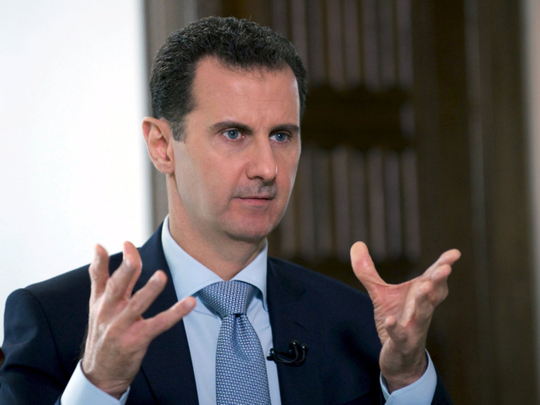
The Geneva peace talks on Syria are on the verge of collapse as the main opposition group decided to withdraw from the talks after accusing the regime of President Bashar Al Assad of not being serious about finding a solution to the five-year conflict. Damascus has so far refused to discuss the establishment of a transitional governing body, considered by the opposition as the key to solving the crisis. Faisal Moqdad, Deputy Foreign Minister in the Syrian regime, ruled out any negotiations on the fate of Al Assad, saying that the opposition has to let go of its “dream” of a transitional government, which “would amount to a coup d’etat”.
But before making this statement, which effectively means that the talks will lead to nowhere, Moqdad paid a visit to Moscow, wherein he was briefed by his Russian allies on the results of the recent talks held there by United States Secretary of State, John Kerry.
In late March, a putative agreement on Syria appears to have been reached in Moscow between Kerry and Russian President Vladimir Putin. The deal reflected a growing American acceptance of a Russian proposal to shift the focus away from Al Assad and concentrate instead on amending the Syrian constitution as a means to usher Syria out of the present conflict. This would, according to Moscow, allow the fate of Al Assad to be decided by elections not by negotiations. Washington signalled its agreement in a statement by US State Department spokesperson Mark Toner who, during a regular press briefing, made it clear that the US believed the fate of Al Assad should be decided by “a political process that reflects the desires and will of the Syrian people”.
In fact, despite the mixed messages and political manoeuvring, Russia continues to oppose the removal of Al Assad as a prerequisite to reaching a peace agreement in Syria, arguing that his departure would lead to the collapse of the Syrian state. As the US position drew closer to the Russian’s, Moscow was emboldened enough to move a step further and suggest that Al Assad even be allowed to run in the presidential elections, due to take place within 18 months of the start of the peace process. The new constitution would, however, move Syria away from the presidential system into a parliamentary model. This would see the president chosen not through a general election, but by the House of Representatives. In such a system, the role of the president will be purely ceremonial; while his power will be transferred to the cabinet. Today, American and Russian negotiators are apparently in agreement that the re-drafting of the Syrian constitution should have precedence over deciding the composition of Syria’s government during the transitional period or the fate of Al Assad. Kerry has made it clear that the amendment of the constitution should be completed no later than August 2016.
The problem with this plan is that no future Syrian government will be able to exercise its authority so long as Al Assad remains in Syria; even if his official role becomes purely symbolic. At the end of the day, Al Assad’s control of Syria’s military and security apparatus goes well beyond his formal position as head of state or commander in chief of the armed forces. The military and security establishments owe their very existence to the Al Assad inner clique and are not about to abandon him as long as he remains in Syria.
In Yemen, the case of ousted president Ali Abdullah Saleh gives some indication of what the Syrian people can expect if Al Assad is allowed to remain in Syria. Even after his ousting, Saleh proved capable of exercising control over the military despite his pretence of abdicating constitutional authority. In Syria, one can only speculate at how far Al Assad’s ability to command the respect of the military will extend. So long as he remains in Syria, any constitutional amendment that curtails Al Assad’s power will not be worth the paper it is written on, since his dictatorial powers are not rooted in the constitution, they cannot be contained by it.
Above and beyond everything else, one would expect a “ceremonial” or “figurehead” president, in particular, to act as a symbol of the unity of the nation, who derives power from a series of achievements for the national good and in which the president can take pride. Could one expect Al Assad to fill such a role for Syria? It appears that, as far as the White House and the Kremlin are concerned, the outright destruction of Syria, the loss of up to half a million Syrian lives and the displacement of almost half of the nation’s population, are accomplishments for which Al Assad should be awarded with an honorary role!
Dr Marwan Kabalan is a Syrian academic and writer.










